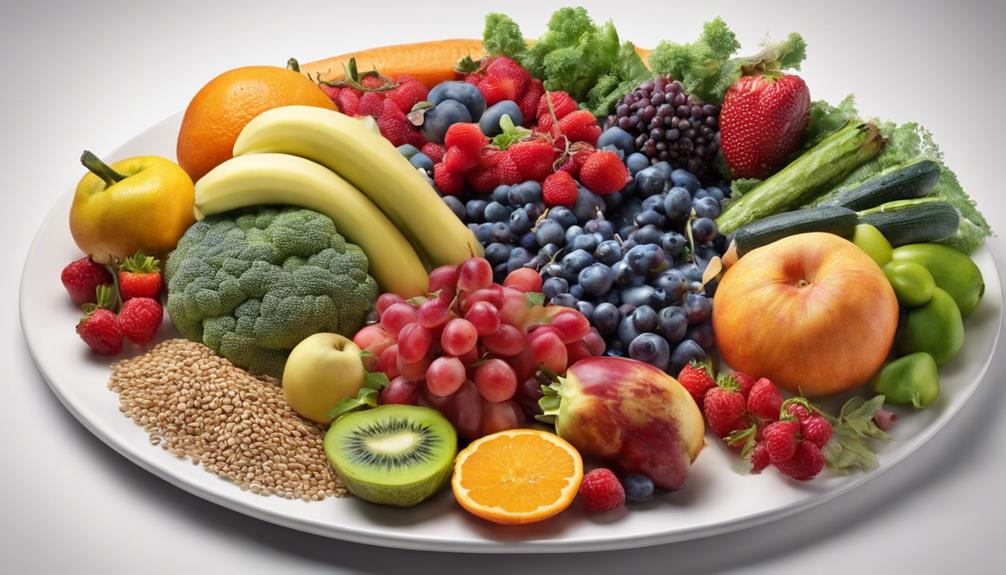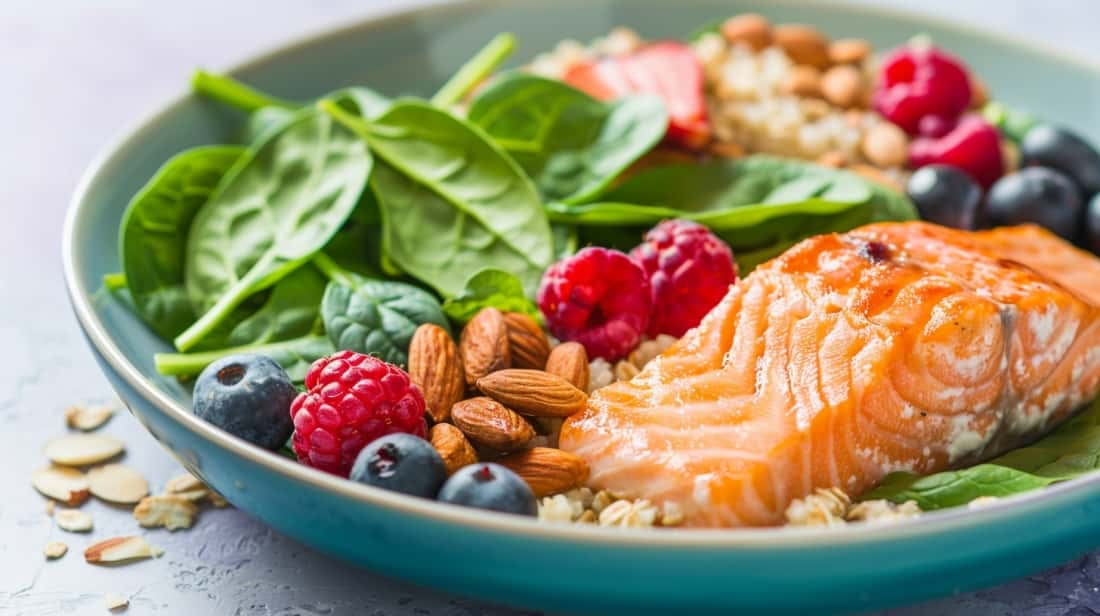As we navigate the domain of maintaining a balanced diet while breastfeeding, one aspect that often goes unnoticed is the impact of different food choices on the taste of breast milk.
Have you ever considered how the flavors in your meals can influence your baby's palate and future food preferences? Understanding this fascinating connection can shed light on the importance of diverse and nutritious eating habits during this critical time.
Let's explore how our dietary decisions can shape not only our own well-being but also that of our little ones.
Key Takeaways
- Prioritize nutrient-rich foods for optimal maternal and baby health.
- Meet increased caloric needs with nutrient-dense choices like fruits, vegetables, and lean proteins.
- Ensure essential nutrients for baby's growth through a balanced diet and possible supplements.
- Maintain hydration levels to support milk production and overall well-being.
Importance of Nutrient-Rich Foods
Indulging in a variety of nutrient-rich foods is important for breastfeeding moms to make sure the essential vitamins and minerals important for both the mother and baby are readily available. A healthy diet packed with nutrients not only provides the energy needed for the demands of breastfeeding but also supports the production of quality milk for the baby. During the postpartum period, the body goes through significant changes, and consuming nutrient-rich foods plays an important role in aiding recovery and maintaining overall well-being.
Foods rich in vitamins and minerals such as fruits, vegetables, whole grains, lean proteins, and healthy fats are essential components of a breastfeeding mother's diet. These foods help prevent nutrient deficiencies that could impact the health of both the mother and the baby. By ensuring a balanced intake of nutrients, mothers can optimize their own health and pass on essential nutrients through breast milk, promoting the baby's growth and development. Prioritizing a nutrient-rich diet is a cornerstone of successful breastfeeding and postpartum recovery.
Caloric Needs for Breastfeeding Moms

During breastfeeding, it's important for mothers to be mindful of their increased caloric needs to support milk production, which typically require an additional 330 to 400 calories per day. These caloric requirements can vary depending on factors such as maternal weight, activity level, and metabolism. Adequate caloric intake plays a critical role in preventing fatigue and ensuring key nutrition for both mom and baby.
To meet these needs, focusing on nutrient-dense foods like fruits, vegetables, lean proteins, and whole grains is essential. These foods not only provide the necessary calories but also supply essential nutrients for overall health.
It is advisable to consult with a healthcare provider or a dietitian to determine the right caloric intake based on individual circumstances. Your healthcare provider can offer personalized recommendations that consider factors unique to you. By addressing your specific caloric needs, you can support both your own well-being and the healthy development of your baby.
Essential Nutrients for Baby's Growth
To guarantee top growth for your baby, it is critical to provide essential nutrients through breast milk, which serves as a key source of protein, fats, carbohydrates, vitamins, and minerals. Ensuring your baby receives the necessary nutrients is vital for their overall development and health. Here is a table highlighting some essential nutrients for your baby's growth:
| Nutrient | Function | Food Sources |
|---|---|---|
| Iron | Essential for oxygen transport in the body | Lean meats, legumes, tofu |
| Calcium | Vital for bone and teeth development | Dairy products, leafy greens |
| Omega-3 Fatty Acids | Important for brain and eye development | Fatty fish, flaxseeds, chia seeds |
Incorporating these nutrients into your diet not only benefits your baby but also supports your own health. Remember, a balanced and healthy diet rich in protein, vitamins, and minerals will contribute to your baby's brain development and overall growth. Don't forget to consult with your healthcare provider regarding the need for vitamin D supplements to ensure your baby's optimal growth.
Hydration Tips for Breastfeeding Mothers

Ensuring proper hydration is fundamental for breastfeeding mothers as it directly impacts milk production and quality for their infants. Breast milk is primarily composed of water, highlighting the critical role of staying hydrated while breastfeeding.
Dehydration can be signaled by concentrated urine, indicating the need for increased fluid intake. Adequate hydration not only supports milk production but also enhances its quality, benefiting both the mother and baby. It's essential to drink in response to thirst cues and maintain hydration levels consistently throughout the day.
Proper hydration is key for overall health, sustaining energy levels, and promoting the well-being of breastfeeding mothers. By prioritizing adequate fluid intake, breastfeeding women can optimize the quality of milk they provide for their infants, reaping the benefits of a well-hydrated body.
Balancing Macronutrients for Optimal Health
Balancing macronutrients is essential for maintaining excellent health during breastfeeding, supporting both the nutritional needs of the mother and the growth of the baby. When crafting your meals, consider the following:
- Protein: Incorporate lean meats, poultry, fish, eggs, dairy, legumes, and nuts to aid in tissue repair and growth.
- Healthy Fats: Opt for sources like avocados, nuts, seeds, and olive oil to provide energy and nurture your baby's brain development.
- Complex Carbohydrates: Choose whole grains, fruits, and vegetables to sustain energy levels and promote digestive health with fiber.
- Balanced Diet: Ensuring a mix of proteins, fats, and carbohydrates in your diet supports both your nutritional needs and your baby's growth, maintaining energy levels and overall health.
These macronutrients play a crucial role in your well-being during breastfeeding, offering the necessary nutrients for you and your baby's development while keeping energy levels up and digestive health in check.
Frequently Asked Questions
How Do I Eat a Balanced Diet While Breastfeeding?
We eat a balanced diet while breastfeeding by including a variety of foods from all groups, prioritizing fruits, veggies, whole grains, lean proteins, and dairy. Staying hydrated with water is essential. Consulting experts for a tailored plan is wise.
What Are the Dietary Guidelines for Breastfeeding Mothers?
We aim to follow dietary guidelines for breastfeeding mothers. It's crucial to consume at least 2 portions of fish weekly, with one being oily. Limiting certain fish types and ensuring safe food practices are crucial for a healthy diet.
What Is the Best Diet for Breastfeeding Mothers?
We've found that the best diet for breastfeeding involves a variety of nutrient-rich foods like protein, whole grains, fruits, veggies, and healthy fats. Hydration is key, so water up! Limit processed foods and caffeine for peak health.
What Are the Food Rules for Breastfeeding?
We focus on nutrient-dense foods like lean proteins, whole grains, fruits, and veggies for milk production and health. Omega-3 sources aid baby's brain, calcium-rich foods support bones, iron-rich foods prevent deficiency, and hydration is key.
Conclusion
To sum up, maintaining a balanced diet while breastfeeding is vital for the health of both mother and baby. By focusing on nutrient-rich foods, staying hydrated, and meeting increased caloric needs, mothers can support their baby's growth and well-being.
For example, Sarah, a new mom, noticed a difference in her energy levels and milk supply when she started incorporating more fruits and vegetables into her meals. Remember, a healthy diet is key to a successful breastfeeding journey.









